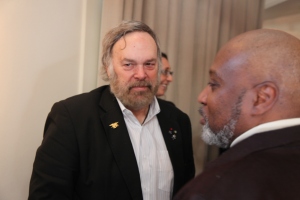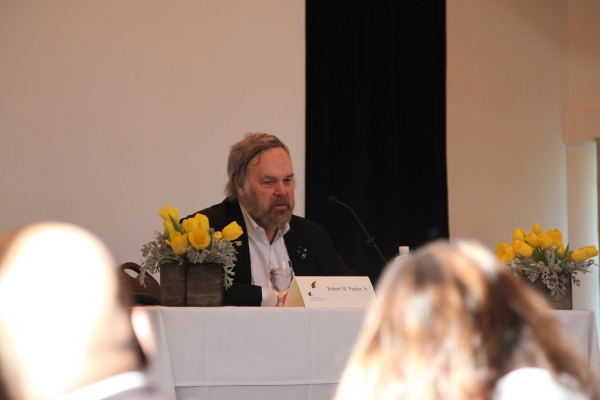While there were many highlights to last week’s Wine Writers Symposium at the Meadowood Resort in the Napa Valley, there was no disagreement that Wednesday’s 8:30 a.m. keynote presentation by Robert M. Parker, Jr. was the highlight of the event. Only a man of Parker’s stature could cause 45 wine writers, who had imbibed late into the evening, to be in their seats well ahead of the appointed start time.
Before Parker entered the room, The Symposium Chair got on stage to strongly suggest that we consider the session a treat to behold, rather than a reportable event. In other words, he didn’t want us to write about it, probably fearing that the cantankerous Parker would never speak to us ever again. (This was the first time Parker had ever addressed this forum in its ten-year history.) However, some of the writers in attendance either conveniently forgot or blatantly ignored the Chairman’s request, so some very well-written, detailed write-ups have hit the blogosphere today.
To read detailed accounts of the one-hour keynote, I direct you to the entries that my colleagues Richard Jennings and Katie Kelly Bell have penned. I, on the other hand, would prefer to give some observations and opinions on this highly-anticipated keynote. As a relative newcomer to the world of wine writing, it was fascinating to have a front-row (okay, second-row) seat as the king of the wine writing world addressed those who seek his crown.
As a quick history lesson for my readers whose lives are not consumed by wine, Parker started writing about wine in the mid-1970s as a sidelight to his law career. While there were other wine critics, he quickly built his fame through his wine newsletter, The Wine Advocate. He also created a 100-point scoring system to rate wines, which eventually became as controversial as it was revered. As his influence grew, it was soon possible to see that Parker’s ratings began to have a significant effect not only on wine prices, but on how wines were made. High scores allowed wineries to raise prices, and made owners millions of additional dollars. Low ratings, naturally, has a less-positive impact on prices. But what really started to rile people in the industry was what has been coined the “Parkerization” of wine. Parker has an affinity for big, bold, ripe wines that are high in alcohol and get better with age, and eschews more nuanced and acidic wines. (This is an over-simplistic description, I realize, but you can read more in Wikipedia.) Because winemakers saw the positive economic benefit of a high Parker rating, they started making wines they hoped he would like, to get a better rating. This led to a feared homogenization of the world’s leading wines. Over time, new wine critics emerged, with differing palates and opinions, who started throwing stones at Parker and his empire. Parker threw the stones right back. And several of the people involved in the stone-throwing were sitting in the audience at the Meadowood with me that morning.
Among those in the room were Eric Asimov, chief wine critic of the New York Times; Jon Bonné, author and wine editor of the San Francisco Chronicle; Alder Yarrow, owner of Vinography wine blog; Karen MacNeil, author of The Wine Bible; Jay MacInerney, author and wine critic for the Wall Street Journal; and Elin McCoy, author of the unauthorized biography on Parker titled The Emperor of Wine. Most had taken umbrage with Parker at one time or other, and recently several of the writers have taken issue with Parker’s steadfast promotion of big bold wines even as the world has moved to newer, lighter and more varied wines.
 Many in the room expected fireworks, but frankly they failed to materialize. Parker entered the room appearing disheveled, as if he had just gotten out of bed. That, combined with his fragile gait due to recent spinal surgery, gave many a sense that, like so many older wines, he too had passed his prime. However, his brain and mouth were fully synched and he presented himself with a surprising warmth and likability. Did he say some controversial and arrogant things? Absolutely. Is he opinionated and stubborn? For sure. Does he admit to having detractors? Oh yes. But he gave us the sense that he doesn’t have any trouble sleeping at night.
Many in the room expected fireworks, but frankly they failed to materialize. Parker entered the room appearing disheveled, as if he had just gotten out of bed. That, combined with his fragile gait due to recent spinal surgery, gave many a sense that, like so many older wines, he too had passed his prime. However, his brain and mouth were fully synched and he presented himself with a surprising warmth and likability. Did he say some controversial and arrogant things? Absolutely. Is he opinionated and stubborn? For sure. Does he admit to having detractors? Oh yes. But he gave us the sense that he doesn’t have any trouble sleeping at night.
A 30-minute “off-the-cuff” talk by Parker was followed by a 30-minute Q&A session with the audience. The most interesting question as far as I was concerned was the one asked by Jon Bonné, who is a strong advocate of, basically, the wines that Parker doesn’t like. Bonné asked a long question, carefully worded to avoid raising any ire, but trying to get Parker to agree that there is room for more diversity in wine varietals. Parker actually started his reply by saying “I basically agree with you,” and then went on a 4-minute diatribe whereby he basically disagreed completely with the approach of making lower-alcohol wines that won’t stand the test of time.
During the course of the hour, Parker stated that he hoped we would all be successful as wine writers, which on the surface is noble and magnanimous, but he also stated that he hoped the wine writing profession would not decline once he is gone. We all winced at that one.
And finally, Parker ended by wishing that wine writers could all be more civil toward one another, somehow joining together as wine lovers and abandoning some of the negativity that has populated wine writing over the past few years. He even offered us his office phone number as a sort of olive branch should we wish to talk directly to him about a contentious issue, rather than putting our vitriol in print. It was an interesting way to close an interesting discussion.
Overall, I believe the assembled writers felt honored to have the opportunity to hear Mr. Parker speak in person to a group of peers, but I am not sure that a whole lot of opinions were changed. But my general belief is that controversy in wine writing, like in many aspects of life, is a good thing. If everyone had the same opinions, life would be pretty damn boring. Controversy sells magazines and newspapers (and blogs, I guess.) People want to read about and discuss disparate viewpoints. There is always room for another opinion…and if the wine world is about anything, it’s about opinions.


Pingback: Terroirist: A Daily Wine Blog » Daily Wine News: Weedy Wines